| Listing 1 - 10 of 13 | << page >> |
Sort by
|
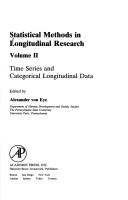
ISBN: 012724963X 0127249605 0127249613 0127249621 1322480532 1483297950 9780127249605 Year: 1990 Publisher: Boston : Academic Press Inc.,
Abstract | Keywords | Export | Availability | Bookmark
 Loading...
Loading...Choose an application
- Reference Manager
- EndNote
- RefWorks (Direct export to RefWorks)
Social sciences --- Longitudinal studies. --- Statistical methods. --- -Longitudinal studies --- Statistical methods --- Research --- Longitudinal studies --- -Social sciences --- -Behavioral sciences --- Human sciences --- Sciences, Social --- Social science --- Social studies --- Civilization --- Sciences sociales --- Mathematical statistics. --- Statistique mathématique. --- Méthodes statistiques --- Études longitudinales. --- Social sciences - Statistical methods - Research --- Social sciences - Longitudinal studies - Research --- Statistique mathématique. --- Méthodes statistiques --- Études longitudinales.
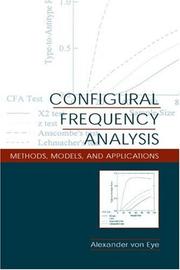
ISBN: 1135630860 1282378937 9786612378935 1410606570 9781410606570 9780805843248 0805843248 080584323X 0805843248 9780805843231 9781135630812 9781135630850 9781135630867 1135630852 Year: 2002 Publisher: Mahwah, N.J. Lawrence Erlbaum Associates
Abstract | Keywords | Export | Availability | Bookmark
 Loading...
Loading...Choose an application
- Reference Manager
- EndNote
- RefWorks (Direct export to RefWorks)
Configural Frequency Analysis (CFA) provides an up-to-the-minute comprehensive introduction to its techniques, models, and applications. Written in a formal yet accessible style, actual empirical data examples are used to illustrate key concepts. Step-by-step program sequences are used to show readers how to employ CFA methods using commercial software packages, such as SAS, SPSS, SYSTAT, S-Plus, or those written specifically to perform CFA. CFA is an important method for analyzing results involved with categorical and longitudinal data. It allows one to answer the question of
Discriminant analysis. --- Psychometrics. --- Measurement, Mental --- Measurement, Psychological --- Psychological measurement --- Psychological scaling --- Psychological statistics --- Psychology --- Psychometry (Psychophysics) --- Scaling, Psychological --- Psychological tests --- Scaling (Social sciences) --- Analysis, Discriminant --- Classification theory (Statistics) --- Discrimination theory (Statistics) --- Multivariate analysis --- Measurement --- Scaling --- Methodology --- Psychometrics --- Discriminant analysis
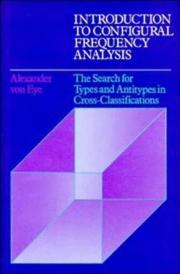
ISBN: 0521380901 051162946X Year: 1990 Publisher: Cambridge : Cambridge University Press,
Abstract | Keywords | Export | Availability | Bookmark
 Loading...
Loading...Choose an application
- Reference Manager
- EndNote
- RefWorks (Direct export to RefWorks)
Configural Frequency Analysis (CFA) is a method for analysis of groups of individuals in cross-classifications. Individuals belong to a type if their particular pattern of characteristics occurs more often than expected, and to an antityte if their particular pattern of characteristics occurs less often than expected. The author's original contribution is his linking of CFA to log-linear modeling and the General Linear Model, enabling the reader to relate CFA to a well-known statistical background. It is shown that CFA and log-linear modeling are methods that complement each other. Introduction to Configural Frequency Analysis covers the latest developments in CFA, and it will be easy to read even for those with only an elementary statistics course as a background.
Discriminant analysis. --- Psychometrics. --- Health Sciences --- Psychiatry & Psychology --- Analysis, Discriminant --- Classification theory (Statistics) --- Discrimination theory (Statistics) --- Multivariate analysis --- Measurement, Mental --- Measurement, Psychological --- Psychological measurement --- Psychological scaling --- Psychological statistics --- Psychology --- Psychometry (Psychophysics) --- Scaling, Psychological --- Psychological tests --- Scaling (Social sciences) --- Measurement --- Scaling --- Methodology
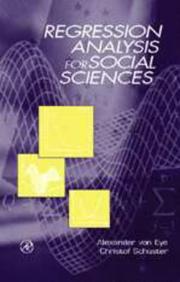
ISBN: 0127249559 Year: 1998 Publisher: San Diego, Calif. : Academic Press,
Abstract | Keywords | Export | Availability | Bookmark
 Loading...
Loading...Choose an application
- Reference Manager
- EndNote
- RefWorks (Direct export to RefWorks)
Regression analysis. --- Social sciences --- Statistical methods. --- Sciences sociales --- Analyse de régression --- Méthodes statistiques
Book
ISBN: 1281057126 9786611057121 0080550827 9780080550824 9781281057129 9780127249551 Year: 1998 Publisher: San Diego, Calif. Academic Press
Abstract | Keywords | Export | Availability | Bookmark
 Loading...
Loading...Choose an application
- Reference Manager
- EndNote
- RefWorks (Direct export to RefWorks)
Regression Analysis for Social Sciences presents methods of regression analysis in an accessible way, with each method having illustrations and examples. A broad spectrum of methods are included: multiple categorical predictors, methods for curvilinear regression, and methods for symmetric regression. This book can be used for courses in regression analysis at the advanced undergraduate and beginning graduate level in the social and behavioral sciences. Most of the techniques are explained step-by-step enabling students and researchers to analyze their own data. Examples include data fr
Social sciences --- Regression analysis. --- Analysis, Regression --- Linear regression --- Regression modeling --- Multivariate analysis --- Structural equation modeling --- Statistical methods.
Book
ISBN: 3662640074 3662640082 Year: 2021 Publisher: Berlin, Germany : Springer,
Abstract | Keywords | Export | Availability | Bookmark
 Loading...
Loading...Choose an application
- Reference Manager
- EndNote
- RefWorks (Direct export to RefWorks)
Discriminant analysis. --- Psychometrics. --- Psicometria --- Anàlisi discriminant --- Teoria de la classificació (Estadística) --- Teoria de la discriminació (Estadística) --- Anàlisi multivariable --- Escales psicològiques --- Mesuraments mentals --- Mesuraments psicològics --- Escales (Ciències socials) --- Psicofisiologia --- Anàlisi factorial --- Escala multidimensional --- Metaanàlisi --- Tests i proves en educació --- Psicofísica --- Tests psicològics --- Measurement, Mental --- Measurement, Psychological --- Psychological measurement --- Psychological scaling --- Psychological statistics --- Psychology --- Psychometry (Psychophysics) --- Scaling, Psychological --- Psychological tests --- Scaling (Social sciences) --- Analysis, Discriminant --- Classification theory (Statistics) --- Discrimination theory (Statistics) --- Multivariate analysis --- Measurement --- Scaling --- Methodology
Book
ISBN: 1009322168 1009322176 1009322184 1009322206 Year: 2023 Publisher: Cambridge, United Kingdom ; New York, NY : Cambridge University Press,
Abstract | Keywords | Export | Availability | Bookmark
 Loading...
Loading...Choose an application
- Reference Manager
- EndNote
- RefWorks (Direct export to RefWorks)
General Linear Model methods are the most widely used in data analysis in applied empirical research. Still, there exists no compact text that can be used in statistics courses and as a guide in data analysis. This volume fills this void by introducing the General Linear Model (GLM), whose basic concept is that an observed variable can be explained from weighted independent variables plus an additive error term that reflects imperfections of the model and measurement error. It also covers multivariate regression, analysis of variance, analysis under consideration of covariates, variable selection methods, symmetric regression, and the recently developed methods of recursive partitioning and direction dependence analysis. Each method is formally derived and embedded in the GLM, and characteristics of these methods are highlighted. Real-world data examples illustrate the application of each of these methods, and it is shown how results can be interpreted.
Linear models (Statistics) --- Social sciences --- Statistics. --- Statistical methods. --- Statistical analysis --- Statistical data --- Statistical methods --- Statistical science --- Mathematics --- Econometrics --- Models, Linear (Statistics) --- Mathematical models --- Mathematical statistics --- Statistics
Book
ISBN: 9781009322164 9781009322171 9781009322157 Year: 2023 Publisher: Cambridge, United Kingdom ;New York, NY Cambridge University Press
Abstract | Keywords | Export | Availability | Bookmark
 Loading...
Loading...Choose an application
- Reference Manager
- EndNote
- RefWorks (Direct export to RefWorks)
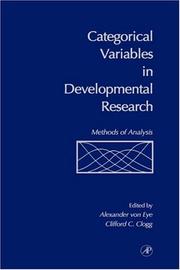
ISBN: 0127249656 9786611038571 1281038571 0080528716 9780080528717 9780127249650 Year: 1996 Publisher: San Diego : Academic Press,
Abstract | Keywords | Export | Availability | Bookmark
 Loading...
Loading...Choose an application
- Reference Manager
- EndNote
- RefWorks (Direct export to RefWorks)
This book provides developmental researchers with the basic tools for understanding how to utilize categorical variables in their data analysis. Covering the measurement of individual differences in growth rates, the measurement of stage transitions, latent class and log-linear models, chi-square, and more, the book provides a means for developmental researchers to make use of categorical data.The book covers: * Measurement and repeated observations of categorical data * Catastrophe theory * Latent class and log-linear models * Applications
Categories (Mathematics). --- Psychology --- Psychometrics. --- Statistical methods. --- Categories (Mathematics) --- -Psychometrics --- Measurement, Mental --- Measurement, Psychological --- Psychological measurement --- Psychological scaling --- Psychological statistics --- Psychometry (Psychophysics) --- Scaling, Psychological --- Psychological tests --- Scaling (Social sciences) --- Category theory (Mathematics) --- Algebra, Homological --- Algebra, Universal --- Group theory --- Logic, Symbolic and mathematical --- Topology --- Functor theory --- Behavioral sciences --- Mental philosophy --- Mind --- Science, Mental --- Human biology --- Philosophy --- Soul --- Mental health --- Statistical methods --- Measurement --- Scaling --- Methodology --- Psychometrics

ISBN: 9780080528717 0080528716 9780127249650 0127249656 1281038571 9786611038571 Year: 1996 Publisher: San Diego Academic Press
Abstract | Keywords | Export | Availability | Bookmark
 Loading...
Loading...Choose an application
- Reference Manager
- EndNote
- RefWorks (Direct export to RefWorks)
This book provides developmental researchers with the basic tools for understanding how to utilize categorical variables in their data analysis. Covering the measurement of individual differences in growth rates, the measurement of stage transitions, latent class and log-linear models, chi-square, and more, the book provides a means for developmental researchers to make use of categorical data.The book covers: * Measurement and repeated observations of categorical data * Catastrophe theory * Latent class and log-linear models * Applications
Categories (Mathematics) --- Psychology --- Psychometrics --- Statistical methods --- Categories (Mathematics). --- Psychometrics. --- Statistical methods.
| Listing 1 - 10 of 13 | << page >> |
Sort by
|

 Search
Search Feedback
Feedback About UniCat
About UniCat  Help
Help News
News